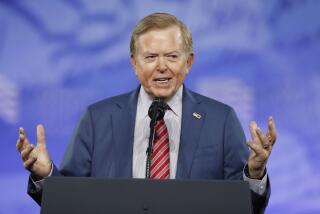Popular ‘Marketplace’ Brings Business World to Street Level
- Share via
Business, like nuclear physics and brain surgery, was long considered a subject beyond the grasp of common folk. And many are the vested interests that wanted to keep it that way. As long as John Q. Public was unable to tell a hedge fund from a hedgerow, armies of well-paid financial advisors were guaranteed employment.
So it was no surprise that Jim Russell and the folks at American Public Radio--now Public Radio International--weren’t exactly embraced 10 years ago when they decided to launch a weekday business show aimed not at Wall Street, but at Main Street. With “Marketplace,” the idea was to make price swings in the supermarket as important as those in the stock market.
“They wanted an entire new concept, and I agreed to develop one,” says Russell. “This is not a show for businessmen. That was one of the fundamental decisions that was made consciously. We’re interested in what business tells us about the world; we’re not really interested in business itself.”
But that wasn’t even the greatest heresy. Doing a business show that wasn’t really about business was one thing. But doing it from Los Angeles, outside the beltway and 3,000 miles from the New York Stock Exchange? That was enough to start John D. Rockefeller spinning in his grave.
Yet anyone who followed the experts on this one had better double-check their portfolio because “Marketplace,” which debuted 10 years ago Saturday, has proved to be a sleeper. And it’s lasted this long partly because it works for merchant bankers as well as merchant marines. Among its frequent listeners, for example, are Treasury Secretary Robert E. Rubin and former Labor Secretary Robert B. Reich as well as tens of thousands of just plain secretaries.
But first, let’s do the numbers. Since its premiere on 77 stations a decade ago, “Marketplace’s” network has grown to 262 outlets--including Armed Forces Radio worldwide as well as Southern California stations KCRW-FM (89.9), KCSN-FM (88.5) and KUSC-FM (91.5). And its weekly audience has grown from an estimated 663,000 listeners at its inception to more than 3.35 million today, the second-largest audience in the nation for a TV, cable or radio business show.
Meanwhile, the “Marketplace Morning Report,” an eight-minute, 50-second spinoff, which airs five times each morning, is already heard on 211 stations.
“I love it. It’s for everybody,” says Alex Cappello, chairman and chief executive of Cappello Group Inc., a merchant banking firm based in Southern California. The show takes a broader look at business, he says, and “they go in depth. You get to hear the voices of the people involved. It makes you think about the personal implications of things. It really rounds you out.”
And the person most responsible for that is Russell, a large, jovial man with mischievous eyes and a quick wit. When Marketplace Productions was formed a decade ago, he was the obvious choice to head it, for two reasons. For starters, he certainly understood radio--as a correspondent and later as an executive producer at National Public Radio, he helped found the network’s signature newscast “All Things Considered” and its morning counterpart, “Morning Edition.”
But more important was the fact that he had absolutely no idea how the business world worked. And that combination of uncompromising professional standards and a wary approach to its subject matter immediately stamped the show with a fresh, unpretentious style unique in the button-down world of public radio. At the same time, though, it had a high-mindedness rare in general-market programming.
“I have no business background and most of our people don’t,” says Russell. “It turned out there were a hell of a lot of people who were very bright, very capable and very intelligent--but who knew nothing in particular about economics. And that became the audience for the show.”
A segment on the retail rush of the holiday season, for example, focused on the stress felt by department-store cashiers rather than the profits the cashiers were ringing up. Other typical stories have dealt with subjects such as modern-day moonshiners, the duties of Hollywood-based celebrity assistants, and how to deal with the decline and death of a parent. In addition to reports prepared in its Los Angeles office, “Marketplace” also airs stories from its five national bureaus as well as bureaus in London and Tokyo.
“We look as business as drama, as irreverent. We try to look at the world through a prism of business and economics,” says executive producer J.J. Yore. “All of those things deal with business and economics and how people manage their lives, how they manage money, how the economy works.”
And to mark its anniversary, beginning next week “Marketplace” will incorporate a new segment, “Marketplace at 10,” which will look back at events as they were reported on the program a decade ago. The initial segment, for example, will feature a clip from “Marketplace’s” coverage of the financial problems then plaguing Pan Am and Braniff airlines.
Still, it’s ironic that a show designed to help people understand economics almost went belly up itself after just a few months.
“We came within three days of closing the whole thing down, laying everybody off,” says Russell. But just when the situation seemed bleakest, Wally Smith and USC Radio came to the rescue, offering money, new studios and help in finding corporate underwriters. So “Marketplace” left its first home in a Long Beach strip mall and moved up the freeway to a drab, vaguely brownish bunker near the Coliseum.
The drafty, windowless building has all the charm of a DMV office, only without the personality. Behind the desk in Russell’s office, for example, plastic blinds rescued from a thrift store hide a wall made from floor-to-ceiling shelving, and though the “Marketplace” studios are somewhat cheerier, so are most Turkish prisons.
The fact that David Brancaccio, the show’s host and senior editor for the last five years, lives on USC’s Fraternity Row and commutes to work on a bicycle only adds to the quirkiness.
“There is a certain wiseacre quality to the show,” says Brancaccio, 38. “We know that in most markets we’re on at the end of the [business] day and we’ve got to make it sort of come alive. The texture of the show is less formal. We take more risks.
“What it is is, can you do smart programming that doesn’t sound like you’re going to church; that you’re having fun with it but it’s not stupid. Business news can be dreadful in the wrong hands. There’s different ways of doing it.”
*
* “Marketplace” airs Monday-Friday on KCRW-FM (89.9) at 2 p.m., KCSN-FM (88.5) at 6:30 p.m. and KUSC-FM (91.5) at 7 p.m.



